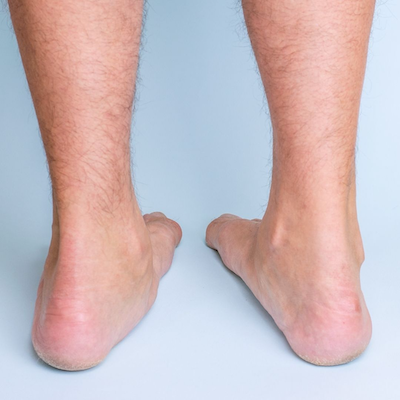Understanding Acquired Adult Foot Deformities
Adult acquired flat foot deformity is a medical condition described as the failure of the middle of our feet to arch when standing. Flat foot can be seen in children but this disappears when the feet develop. Flat feet can develop due to obesity or pregnancy as the feet is unable to retain its form due to the additional weight bearing on the feet. However, in some cases this can be the result of an underlying medical condition.
Flat foot does not usually show any signs or symptoms. It can go unnoticed until pain or a deformity is exhibited. While flat feet could be treated non-surgically extreme cases may require surgery. Consulting a podiatrist is advised for those with flat foot who experience chronic pain.
Flat Foot Signs and Symptoms
- Pain when standing which goes away when feet is rested
- Development of bony bumps in the feet
- Leg pain that radiates from the feet
- Pain when performing intense physical or weight bearing activities
- Swelling and tenderness at the bottom of the feet
Possible causes of Acquired Adult Flat Foot
Diabetes
Loss of sensation or neuroma is a common diabetic complication. This is a result of nerve damage due to the high volume of blood sugar circulating in the body. The loss of sensation makes it impossible for diabetics to detect pain. A diabetics may suffer from a foot injury such as Posterior Tibial Tendon Dysfunction (PTTD) without ever noticing it.
Posterior Tibial Tendon Dysfunction (PTTD)
Posterior Tibial Tendon Dysfunction is a leading cause of acquired adult flat foot. The posterior tibial tendon is a major tendon that supports the foot arch and leg movements like walking. When this becomes injured or damaged it can cause the arch of the foot to collapse. PTTD can be caused by obesity, hypertension, age or diabetes.
Arthritis
Inflammation of the joints or arthritic diseases can result to intense pain in people suffering from flat feet. This is because arthritis does not only damage the joint cartilages but also affect surrounding structures. Extreme cases of arthritis can even lead to foot deformities.
Contact Podiatry Group of Annapolis and let us help with all your foot and ankle needs. Dr. James Mckee and Dr. Adam Weaver are experienced and dedicated podiatrists who provide high-quality individualized care. Call us today at 410-224-4448 or visit us online to make an appointment at our conveniently located Annapolis office.

